September 2016
Family camping
07 09 16 14:51 Filed in: Children 1950s | Teenagers 1960s
Our grandparents and parents had camped as young adults, so living in third world conditions in order to be able to enjoy ‘the bush’ was not a new pastime in our family.
In January 1935, Alf and Alfreda, camping in the bush by the Yellingbow Creek in Woori Yallock, sent letters back to their daughters. In them Alf drew pictures of their camp:
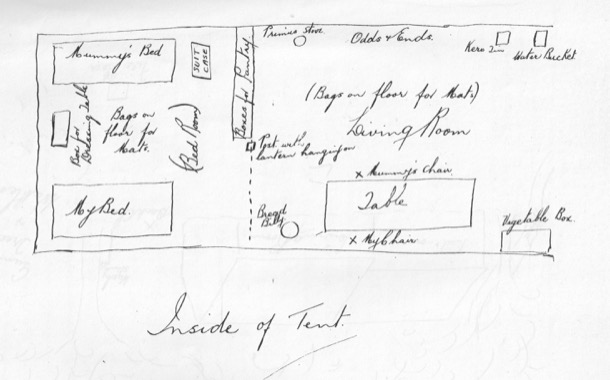
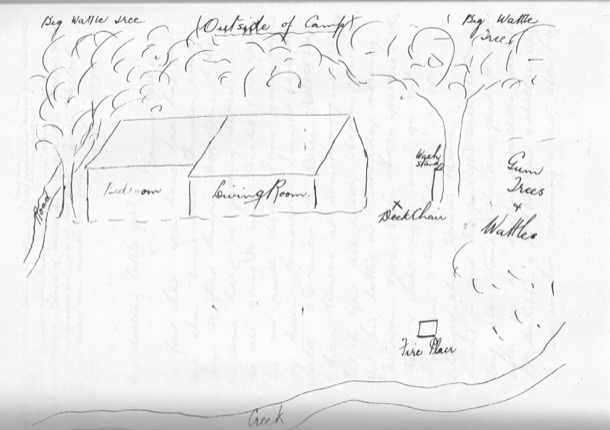
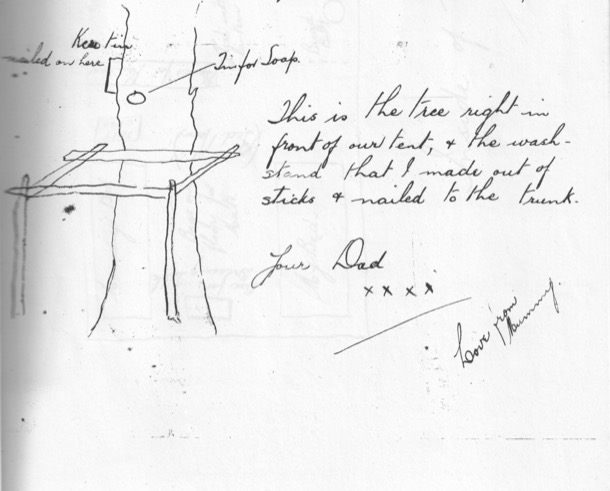
And Alice as an adult, camping with her parents:
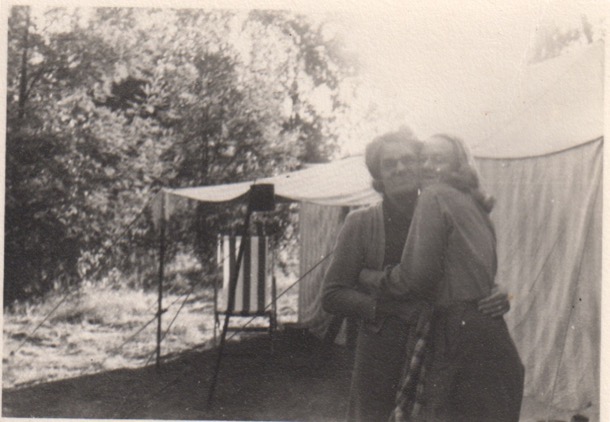
Our parents, Jim and Alice, went camping too:
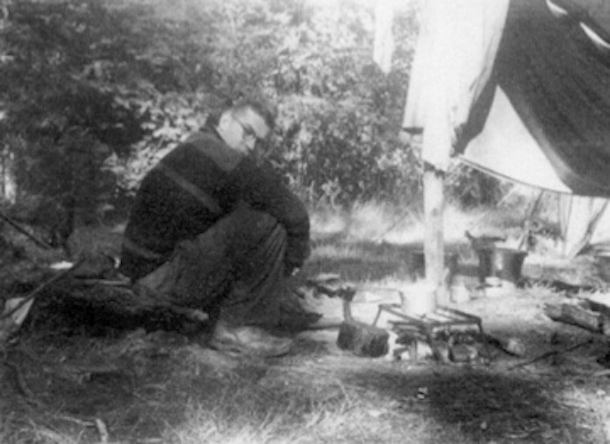
1958 and we kids embarked on our lifetime of camping. It was very exciting. We went to the Prom with the Lees, a family of five who lived at the end our street. We hired a big canvas tent, a simple square and most of the cooking was done outside. I remember this holiday vividly. We all had a wonderful time swimming in the river and the sea and walking. We even all made it to the top of Mt Oberon.
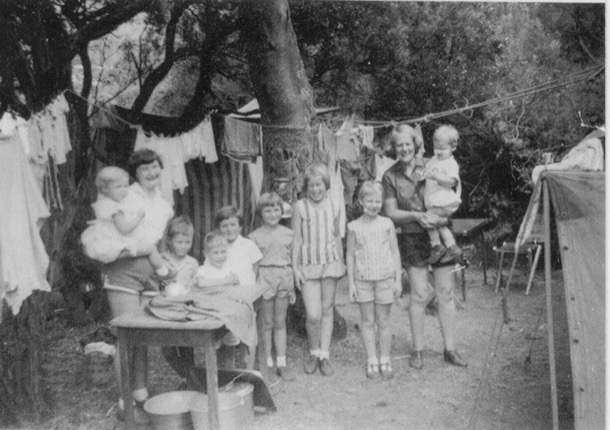
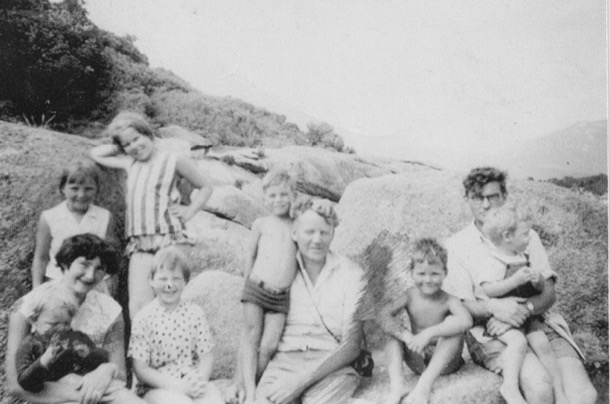
One memorable day there was much preparation for the ‘heat wave’ with temperatures over 100 degrees. Yes, fahrenheit, we are old! A picnic lunch was planned and we waded over the river with supplies for the day. The shady little beach on the other side was the perfect spot for a hot day but i am sure we all managed to get sunburnt. No sunscreen in those days!
That holiday must have been a great success as preparations were made the following year for Christmas holidays to be spent at a new place Mum and Dad had found with the Wilkinsons, a family from the Church. So began the long summer holiday tradition of going to Shoreham.
One of the important purchases that has remained in both our memories was the tent. As we were short of money our parents decided to buy an Army surplus tent. We went to Williamstown to pick it up. In those days driving to Williamstown involved a ride across the mouth of the Yarra on a punt that took a few cars at a time: so interesting that Margaret wrote a Grade 2 Composition on the very subject. Here it as as written:
‘On Sunday we went to hire a tent. It was a very long way. The place we hired the tent from was called Williamstown. On the way we saw many ships and boats. Also we saw a rubbish tip where our Australian rubbish is tiped. When we go there we pressed a button and a man came out. Then we went to buy some icy-poles. When we got back I asked Mummy what a man was doing, Mummy said he was drunk, I said ‘OOOOH’ He herd music playing and wanted to get in. He was knocking and waving then he touched his hat took it off and put it on a man’s knee. Then we had a ride on a queer ferry. which parted from the road.‘
It was a huge heavy old tent, khaki with big black letters and numbers stencilled on the roof. it was rather dark inside and it LEAKED.
Next year Dad’s Uncle Austin died intestate. As he was unmarried, his estate was divided between his relations. The law does not cut people from wills for marrying Protestants so Dad received his share. What a lucky windfall! It enabled us to buy a smart new tent that did not leak and was light and airy
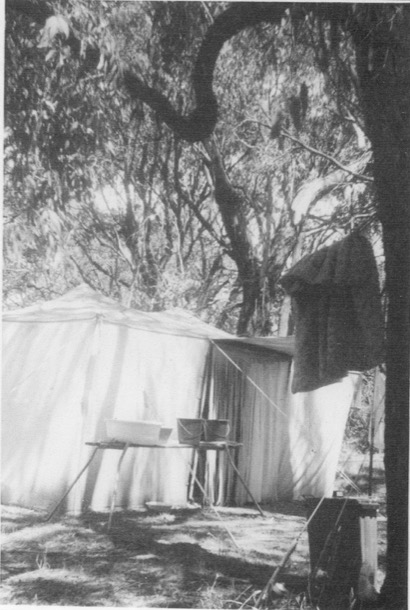
Shoreham Foreshore Camping Ground was on a bushy small promontory on Western Port Bay. It was part of a sleepy small holiday place still surrounded by small farms. There were not a vineyard in sight. The camping sites were well spaced and some were quite secluded. The bookings were done through Mr Webb who was the Ranger and lived in a house abutting the camping area. Water was available in three large water tanks near our site. There were several toilet blocks where, in the morning, a small queue of brunch-coat clad ladies could be seen snaking its way up the hill. Pastel shades and floral prints were the predominant choice of fabric.
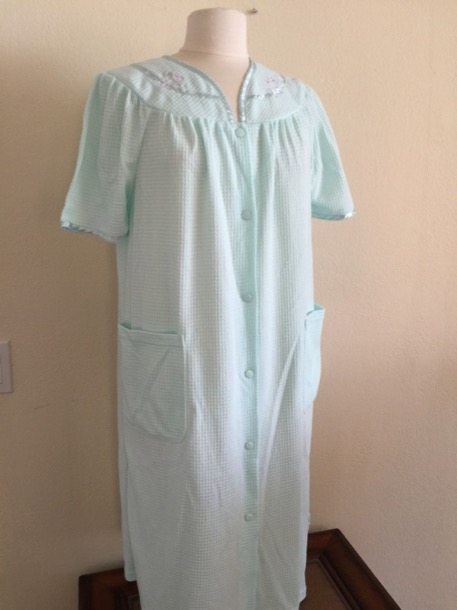
No showers though. Apart from swimming nearly everyday, a bath in the baby’s bath had to suffice.
Our tent was divided into three rooms: two for sleeping, equipped with double bunks, and a general living and kitchen space. We also had a flywire annexe where we had a camping table for meals. The floor, which covered the whole interior, was made from chook food bags we had sewn together on the back lawn. It became quite flat over the years and always smelt pleasantly of chook food pellets.
While Mum was sewing our summer shorts and tops, Dad used to come down a week early and set up camp. It was quite a trailer load and a big job as we had a big wooden chest of drawers, double bunks a two burner gas stove with a griller, chairs, table and an old ice chest. The iceman used to come to the camp ground so we could always keep food cold. In later years we moved onto a gas fridge. A week later we would descend with clothes, food, Christmas presents and a big wooden box of books all ready for a blissful six weeks of beach, shuttlecock, 500, reading and fun.
The book box was quite a feature and sat in the central living space. Dad raided the school library and we all borrowed the maximum from the Box Hill Library. We always had a wonderful collection to choose from. There were often a number of books in series such as A.J. Cronin's series on the life a young doctor in a Welsh mining village in the 1920s and many Who Dunnits. Great absorbing reads that we all looked forward to.
Another of the memorable, nightly rituals was the lighting of the Tilley. Tilleys are kerosene fuelled pressure lights that give out a tremendous amount of white light and therefore were terrific to read by. The lighting ritual was impressive to young eyes as it involved a flaming ‘thing’ that was clapped around the stem of the Tilley. Once the mantle was heated and glowing and the flame had subsided pumping began and we waited with bated breath until the mantle popped and was a light.
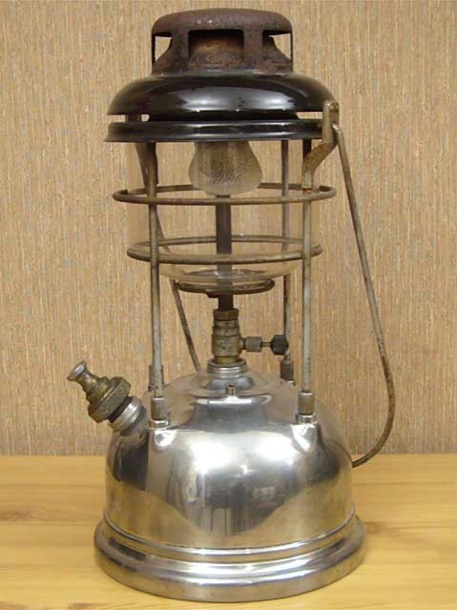
Dinner and washing up would be done and so nightly activities could begin. Often wrapped in rugs we settled down to reading or, more often than not, 500 tournaments. It was great fun.
One wet day game was for Ian and Margaret to embarrass our mother by pretending she was hitting us. We would howl and scream “Pleeeease don’t hit me Mummy! Oh no you’re hurting him!” You get the idea. She would be torn between laughter and horror. Tents have thin walls and we were surrounded by other camping families. Sue even remembers the game extending to shadow play on the tent walls at night. She remembers coming back from the toilets and seeing the acted out scenes of horrific violence. It’s a bit sobering now to consider that some of the “audience” in other tents may well have experienced that violence in their lives for real!
Shoreham has a rocky promontory, exposed at low tide. Then it was too shallow to swim, so we kids spent the time turning over rocks to see the creatures scuttle away, as we walked way out on the rocks. Quite a long way out was “the rock pool”. It was big enough and deep enough to swim in. There was a flat rock at one end which was the “diving board”. The pool was full of waving sea weed, tiny fish, sea horses, anemones. This gave it an exotic, scary atmosphere. Jumping off the diving board and seeing how far we could swim underwater was a favourite game there.
The rocks seemed the same every tide. Year after year we kids clambered roughly over them, caught crabs, and sea urchins, took interesting creatures back to the tent, collected shells.
Sometime over the decades, Shoreham’s bio diversity diminished. There are still crabs, and a few anemones, but the sea horses and sparkly fish are gone.
One year, Ian, aged perhaps seven or eight, turning over one of those rocks, dropped it on his finger. There was lots of blood, huge drama, and a trip to the doctor in Hastings to have it stitched. Sue remembers she and I walking him back to the campground, each of us with an arm around him and Sue with her palm outstretched underneath the finger. She was sure it was about to drop off. I remember feeling very sorry for him because he was not allowed to go in the water for the whole rest of the summer.
Low tide exposed enough flat wet sand for French Cricket. This was organised by the fathers. Everyone played, but we girls really only tolerated it and weren’t very good.
Dad, Ian, Chris and a couple of Wilkinsons:
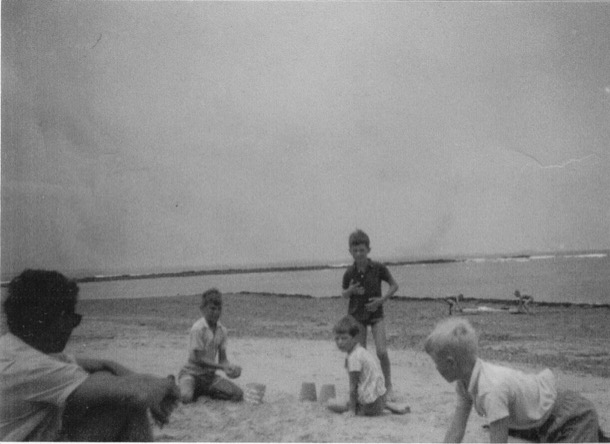
The worst thing about low tide was the sea grass. There were crabs scuttling through its waving fronds and if you swam over it, instead of risking your toes, eventually you felt it on your bare legs and arms and you simply had to stand up.
At high tide Shoreham had wonderful swimming. We would stay in for hours with our poor mother sitting on the beach keeping watch. Sometimes you had to share the water with drifts of dead sea grass, which would pile up in smelly cliffs as the tide went down again.
When our parents could be bothered taking us, we would walk around to the surf beach at Point Leo. Here we could body surf and jump around in the big waves. Later we even had a couple of blow up rubber “boards, like a small lilo with handles. The price you paid for playing in the surf was having to walk back with your bathers full of wet sand. I remember fearing that the wad of sand must have looked as if I’d pooed my pants.
Shoreham beach looking towards Point Leo:
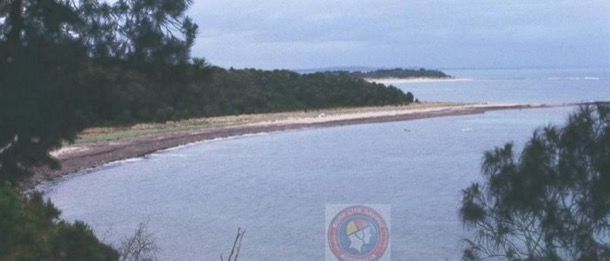
In the other direction was Flinders and the ocean. The view of Flinders from Shoreham was of a long promontory. The Naval Base there used to have gunnery practice, evident to us by puffs of smoke and a distant “whomp whomp”.
Flinders in the far distance:
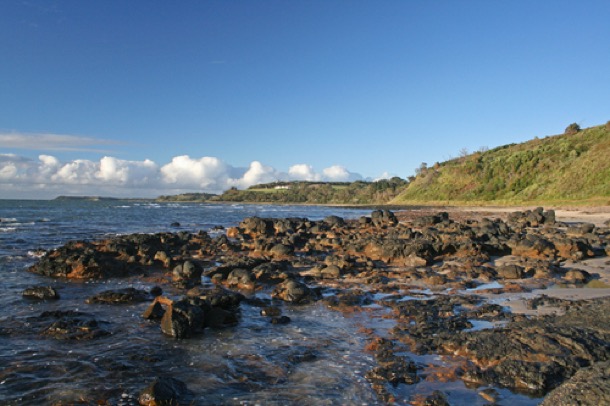
Weekdays involved walking to “the store”. Shoreham had a general store on the edge of the foreshore reserve. Dad and the four kids would walk up along the track, buy The Age, milk and whatever else was needed, even a Drumstick sometimes:
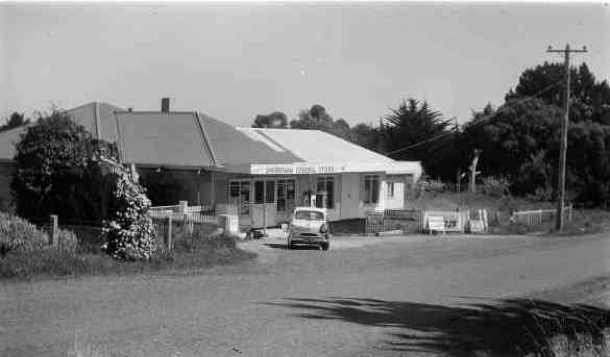
Then we would head along the main road to the Post Office. We took it in turns to go in and ask for “Any letters for Bourke?”. Then we would walk down the post office road to the beach track. Some days we would continue to follow the road past some holidays houses and then rejoin the campground track, but most often we would climb down the steps alongside “Camel’s Hump” and back along the beach. In my memory these steps were steep, treacherous and dangerously slippery. Back at camp Mum would be doing piles of holiday washing all by hand, after lugging the water from the tank and heating it up on the gas stove.
Most years, for one day, usually when it was not beach weather, we would pack a lunch and “walk to Flinders”. Mostly we walked both ways along the beach, making the Flinders pier the turnaround point, but sometimes we came back by the road, and bought fish and chips at the Flinders shop. It was an eight mile round trip, (about thirteen kilometres). The beach between Shoreham and Flinders, mostly deserted and wild, had a succession of small coves and rocky headlands. The first headland, covered in pine trees, separated the camp beach from “Shoreham Proper”.
Walking any distance along the beach included shell collecting. There were lots of interesting and colourful shells but the most prized were the cowries. It was not uncommon for each of us four kids to have twenty in our collection by the end of the summer holiday. We would also collect sea urchins, trapped in amongst the piles of dead sea grass.
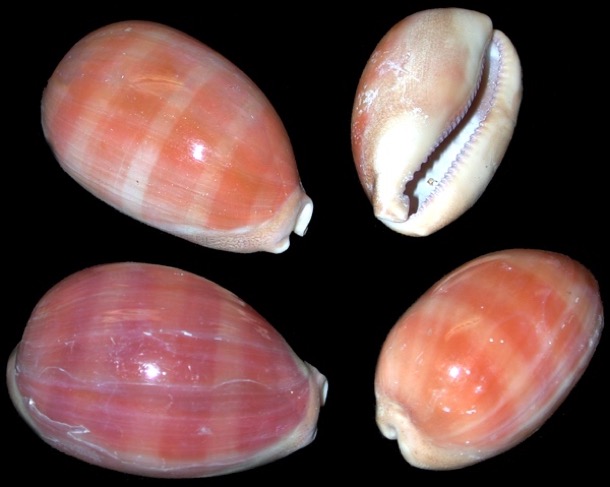
I never understood the pleasures of sun baking, but would spend hours in the water. Our noses were zinc creamed, but not our shoulders. It must have been hard for our mother who was responsible for managing four children’s sun exposure. We were often sunburnt and sometimes even had blisters.
Sue and Mum in the sand dunes:
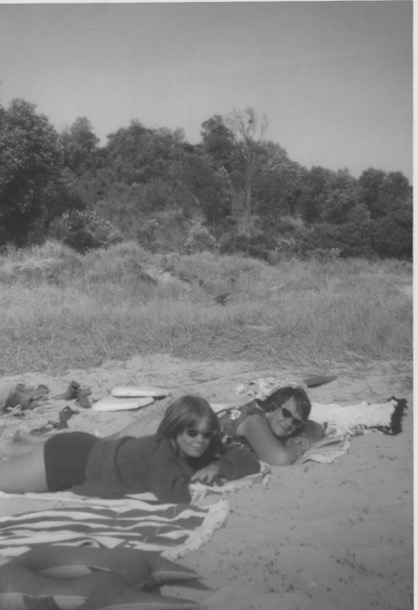
On the six or seven Sundays we were at Shoreham we would dress in the “good” clothes we had brought especially, and shoes (the rest of the time we wore thongs or sandals), and drive to Flinders Presbyterian Church. The Wilkinson family came too. Sue remembers the prickly feeling of a dress on sunburnt back and the resentment of having to go. The church was small and dark and had a small regular congregation. Afterwards we would pile back into the car and race back to the beach.
As the years went on and we went to Shoreham every summer, it became the way I measured the passing years. It was a benchmarking time. The tent set up, the beach, the bush all stayed the same. The people changed gradually, inexorably. Summer holidays was the time to recognise and celebrate this.
This clearly happened for the adults as well. I can remember Alan Wilkinson, chatting to our mother, oblivious of nearby children, the way adults were in those days. “I’m turning forty this year, Al. It’s hard, life’s passing me by.”
By the time I was fourteen I was spending Saturday nights during the year at local church dances. I don’t remember how it came about, but I remember going that summer to a surfer dance at Point Leo Surf Club. This was the time of Little Pattie and Col Joy. Wonderful music in my opinion. I remember a hot, dusty room full of blond suntanned kids, all moving in sync to a band playing covers. The surfy dance was ridiculously simple:
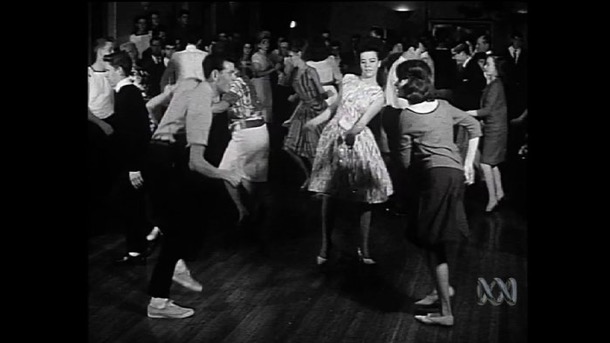
There were always more boys than girls at Shoreham over the summer. Only boys actually surfed. I remember a “date” with a boy who had a car. It was mortifying at first, when my mother insisted that Sue came with us because I was too young, and probably mortifying for her to have to be the chaperone, but I don’t remember where we went, so it can’t have been too bad.
Sue also had romantic episodes at Shoreham. One year she met a fellow camper, who was a Year 12 student doing a navy cadetship. She spent time in Melbourne that summer holidays, doing a “life drawing” course and went out with him over that summer:
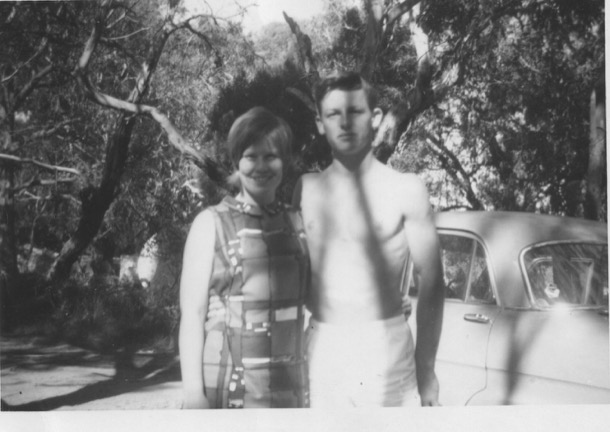
Around the same time Dad and I were involved in a prank at the YMCA camp. Over the summer holidays there were crowds of young boys with older teenagers as camp leaders. I guess Dad might have got talking with the adults at the camp and hatched the plan.
Would I like to be involved? What, you mean walk alone into a room full of a hundred boys having dinner, find the mark, the shyest of the leaders, who has never seen me before, sidle up to him and put my head on his shoulder and snuggle up to him? Try and stop me!
After a few minutes, Dad appeared at the back of the room, brandishing a gun (!) “Where’s my daughter?” he howled.
I don’t remember what happened next, but I have a strong impression of being the only girl surrounded by a crowd of boys and loving it!
Our earlier experience of the YMCA camp was attending the outdoor “pictures”. Campers, each carrying a folding chair, would head off after dinner to the camp and set up facing the strung up bed sheet, amongst all the camp boys.
Shoreham camp was a social place for the adults as well. The same families would camp in the same sites each year, including a few we knew from our real lives. I remember late afternoons on the beach sitting in a group of Bourkes and Wilkinsons, ten kids between us, reluctant to break the spell of the setting sun and then going back to our tent and cooking dinner for fourteen. We had day visitors too, family and friends. I remember Mrs Moss, also a church friend of Mum’s, enormous and perfumed. I remember being impressed after I had complimented her on her dress, when she demurred and pointed out that she didn’t have “her corsets” on.
When the holidays ended we were brown as berries. Packing up was done and then home to the strange sensation of hard floors under our feet and the new school year.
Comments
